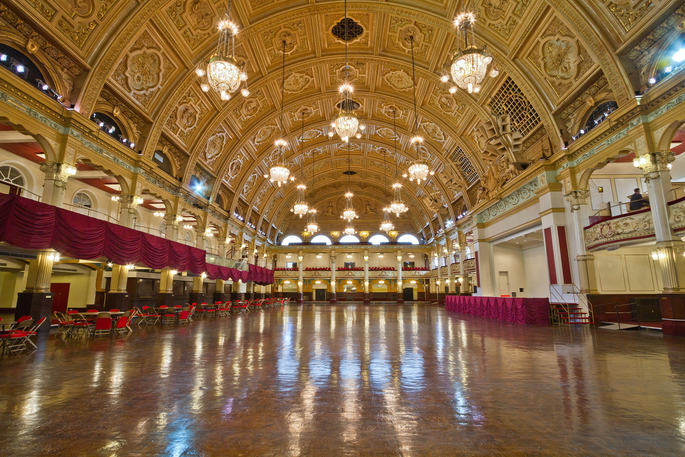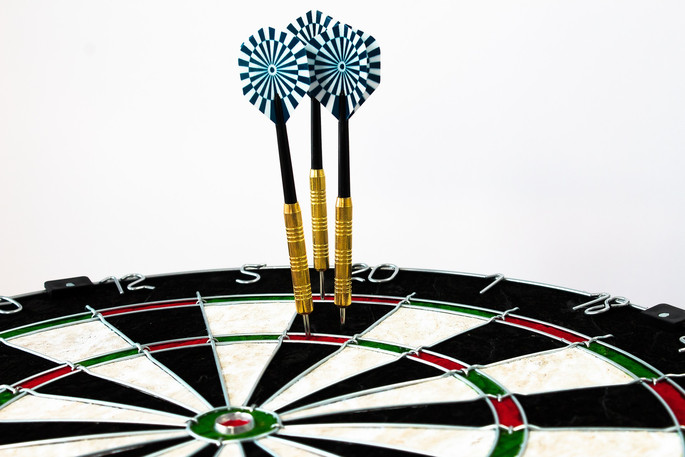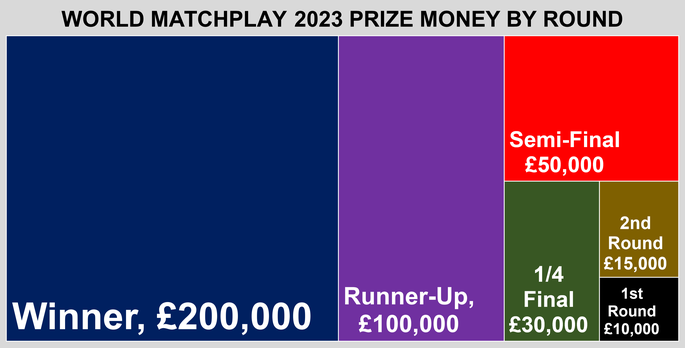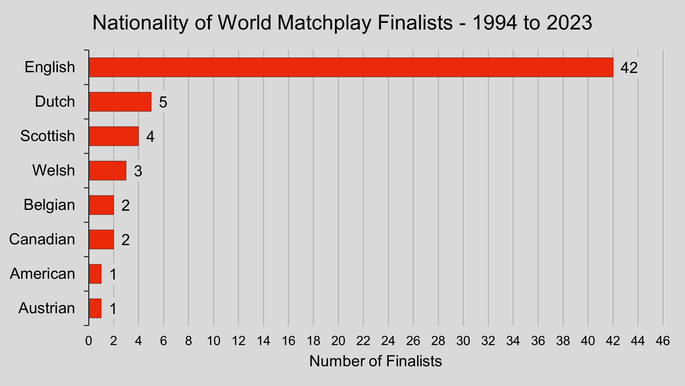Fast Facts
- When: 15th to 23rd July 2023
- Where: Winter Gardens, Blackpool
- Watch: Sky Sports
- Official Website: PDC World Matchplay
The World Matchplay is one of the highlights of the darting calendar. It’s widely regarded as one of the PDC majors, giving it the prestige that a lot of tournaments simply don’t carry.
What’s been impressive about the format of the event is that it often sees for some crazy averages and in turn huge scoring from the players, of which we will talk about more later in the article.
We’ll also have the details on all the best betting offers on the tournament as well as our pointers on the players to follow.
Existing Customer Free Bets & Money Back Offers
Please Note: This event has now ended.
Event Stats
PDC Order of Merit – Top 16 (July 2023)
| Rank | Player | Prize Money | 2022 Stage of Elimination |
|---|---|---|---|
| 1 | Michael Smith | £1,282,500 | Second round |
| 2 | Peter Wright | £1,160,250 | Quarter-finals |
| 3 | Michael van Gerwen | £1,144,250 | Winner |
| 4 | Gerwyn Price | £768,250 | Runner-up |
| 5 | Rob Cross | £593,500 | Second round |
| 6 | Luke Humphries | £591,500 | First round |
| 7 | Jonny Clayton | £530,500 | First round |
| 8 | Danny Noppert | £498,750 | Semi-finals |
| 9 | Nathan Aspinall | £496,000 | Quarter-finals |
| 10 | Dimitri Van den Bergh | £454,000 | Semi-finals |
| 11 | Dirk van Duijvenbode | £434,750 | Quarter-finals |
| 12 | Dave Chisnall | £393,750 | Second round |
| 13 | Damon Heta | £393,250 | First round |
| 14 | Joe Cullen | £389,500 | Second round |
| 15 | Ryan Searle | £367,000 | First round |
| 16 | James Wade | £356,250 | Second round |
Schedule
- 1st Round – Saturday 15th to Monday 17th July 2023 (best of 19 legs)
- 2nd Round – Tuesday 18th & Wednesday 19th July 2023 (best of 21 legs)
- Quarter Finals – Thursday 20th & Friday 21st July 2023 (best of 31 legs)
- Semi Finals – Saturday 22nd July 2023 (best of 33 legs)
- Final – Sunday 23rd July 2023 (best of 35 legs)
About The World Matchplay Darts

It’s entirely possible that not everyone who watches darts realises that the sport used to have two major governing bodies. One side of the sport was covered by the British Darts Organisation until they folded in 2020 and the other was and still is the responsibility of the Professional Darts Corporation. The World Matchplay is normally held at the world famous Winter Gardens in Blackpool and is one of the PDC’s flagship tournaments.
The venue is synonymous with darts fans and often proves to be one of the most entertaining tournaments in the sport. It can also be one of the most intimidating for the players due to the close proximity of the crowd to the oche and the players. Throughout the tournament in July it’s estimated that over three hundred thousand people come through the doors, often watching two sessions during one day.
In 2020 the venue was switched to the Marshall Arena in Milton Keynes and was played without spectators.
The competition has been running since 1994 and it has been won by some of the greatest players to have ever played the game. In its debut year it was Larry Butler who was victorious over Dennis Priestly in a thrilling 16-12 encounter. Since then the tournament has just grown and grown and is now regarded as the second biggest event in darts, behind the World Championships. This is highlighted by the fact that it took just three days for all days of the event to sell out back in 2015.
About the Winter Gardens

The Winter Gardens Empress Ballroom, Blackpool, by Michael D Beckwith flickr
There are not many sporting competitions that take place in such spectacular venues as the World Matchplay event. It gets its name from the fact that the grounds were bought for £28,000 by the Winter Gardens Company in 1875. It opened three years later with the intention of being a concert room and ‘pleasant lounge’ for the days when the weather wasn’t very nice. During the rest of the 1870s the Floral Hall and Pavilion Theatre as well as other areas were built. Over the decade that followed, new parts of the Gardens were developed, including the Opera House Theatre in 1889.
Seven years after that saw the opening of the Empress Ballroom and the Indian Lounge. In 1910, the Opera House Theatre was knocked down and completely rebuilt, with the work coming eighteen years before the Tower Company bought the Winter Gardens Company and the building’s ownership changed hands. That wasn’t the last time that the responsibility for running the complex would become somebody else’s issue, given that EMI bought the Winter Gardens in 1967 and then First Leisure took it over in 1983. It was under First Leisure’s ownership that the World Matchplay event arrived in Blackpool in 1994.
General Format of the Tournament

Each round of the World Matchplay tournament is a straight shootout between the players in a race to a certain number of legs. As the tournament progresses, the number of legs that the players must win in order to progress to the next round increases. The unique thing about the tournament is that a player must win their game by two clear legs to win. As an example, if a match is the first to ten legs and it gets to 9-9, the winner will need to reach 11-9. After six addition legs, it moves to a sudden death format. The idea behind this rule is to stop the player who throws first getting an advantage.
The tournament runs as a straight knockout from the first round to the last. The field starts out with sixty-four players before working its way though down to the final. Players are seeded ahead of the competition getting underway, with seeding based on world ranking points. The top ranked players are often kept apart until later in the tournament, which is seen as their reward for their current ranking. The final is the longest game that is played during the competition as it’s the best of thirty-five legs. Again, if the score is tied at 17-17 then a player must win by two legs before being crowned champion.
The format requiring players to win by two clear legs led to some truly epic battles before the sudden death rule was introduced. In both 1998 and the following year the tournament’s final went to thirty-six legs instead of the allotted eighteen, for example. They were both won by Rod Harrington, beating Ronnie Baxter in 1998 and Peter Manley in 1999. Interestingly, those two finals were the only ones that Harrington played in, giving the Englishman a one hundred percent record in the competition.
Rounds, Seeding and the Draw
The way the PDC have structured the draw is interesting, with the hope being that the final will feature the top two players in the world. They do this by effectively splitting the draw in half, with the top man according to the PDC Order of Merit going in one half of the draw and the man in the number two stop going into the second.
The top sixteen seeds are, as stated earlier, the players that are ranked from one to sixteen on the PDC Order of Merit a couple of weeks before the tournament is due to get underway. The unseeded players are those that have qualified combined with the top sixteen from the ProTour Order of Merit that didn’t make it to the tournament through the qualifying phase. Here’s a look at how the draw worked for the 2023 version of the competition:
World Matchplay Darts Draw – Early Rounds
| First Round | Second Round | Quarter-Final | |
|---|---|---|---|
| Match A | 1st Seed vs Unseeded Player | Winner Match A vs Winner Match B |
1st Quarter Winner Match A/B vs Winner Match C/D |
| Match B | 16th Seed vs Unseeded Player | ||
| Match C | 8th Seed vs Unseeded Player | Winner Match C vs Winner Match D |
|
| Match D | 9th Seed vs Unseeded Player | ||
| Match E | 4th Seed vs Unseeded Player | Winner Match E vs Winner Match F |
2nd Quarter Winner Match E/F vs Winner Match G/H |
| Match F | 13th Seed vs Unseeded Player | ||
| Match G | 5th Seed vs Unseeded Player | Winner Match G vs Winner Match H |
|
| Match H | 12th Seed vs Unseeded Player | ||
| Match I | 2nd Seed vs Unseeded Player | Winner Match I vs Winner Match J |
3rd Quarter Winner Match I/J vs Winner Match K/L |
| Match J | 15th Seed vs Unseeded Player | ||
| Match K | 7th Seed vs Unseeded Player | Winner Match K vs Winner Match L |
|
| Match L | 10th Seed vs Unseeded Player | ||
| Match M | 3rd Seed vs Unseeded Player | Winner Match M vs Winner Match N |
4th Quarter Winner Match M/N vs Winner Match O/P |
| Match N | 14th Seed vs Unseeded Player | ||
| Match O | 6th Seed vs Unseeded Player | Winner Match O vs Winner Match P |
|
| Match P | 11th Seed vs Unseeded Player | ||
The semi-finals will then see the winners of the 1st Quarter Final vs 2nd Quarter Final and the 3rd Quarter Final vs the 4th Quarter Finals. The final will be contested between the two players winning through from these.
World Matchplay Darts Draw – Latter Rounds
| Semi-Final | Final | |
|---|---|---|
| SF 1 | Winner 1st Quarter vs Winner 2nd Quarter | Winner SF 1 vs SF 2 |
| SF 2 | Winner 3rd Quarter vs Winner 4th Quarter | |
That all might look quite complicated written down like that, but if you’ve ever seen a wall chart of the route to the football World Cup final or similar then you’ll know what it all entails.
Prize Money
The prize money for the 2023 version of the World Matchplay works out as follows: From a £800,000 prize fund, the winner takes £200,000, the runner-up gets £100,000. The losing semi-finalists take home £50,000. Those that made it as far as the quarter-finals but no further get £30,000 and the players that exit the tournament in round two will be rewarded with £15,000. The players that made it the first round receive £10,000 for their efforts.

Interesting Facts
Phil Taylor is without doubt the most decorated player in the completion’s history, winning it on no fewer than sixteen separate occasions. The last of these came in 2017 in his final season as a professional. What’s even more remarkable is that he’s played in seventeen finals, winning all but one. To put his feat into some context, Michael van Gerwen is next on the list of winners with three wins, followed by Rod Harrington with two. There have only been nine other winners in total since the start of the competition.
The tournament has seen eight 9-dart finishes, with the first one coming in 2002 and scored by who other than Phil Taylor, doing so again in 2014. In fact, that nine-darter was the first to be broadcast live on TV. Others who have since achieved this feat are Gerwyn Price, Gary Anderson, Raymond van Barneveld, John Part, Michael van Gerwen and Wes Newton. Full details are shown in the table below.
World Matchplay 9-Dart Finishes
| Year | Player | Opponent | Match Result |
|---|---|---|---|
| 2022 | Gerwyn Price | Danny Noppert | Won 17-11 (Semi-final) |
| 2018 | Gary Anderson | Joe Cullen | Won 19-17 (Quarter-final) |
| 2014 | Phil Taylor | Michael Smith | Won 13-6 (2nd round) |
| 2012 | Wes Newton | Justin Pipe | Lost 13-10 (2nd round) |
| 2012 | Michael van Gerwen | Steve Beaton | Won 13-10 (2nd round) |
| 2011 | John Part | Mark Webster | Lost 10-8 (1st round) |
| 2010 | Raymond van Barneveld | Dennis Ovens | Won 10-1 (1st round) |
| 2002 | Phil Taylor | Chris Mason | Won 16-7 (Quarter-final) |
Phil Taylor has the highest single match average of any player at 114.99 in 2010 against Barrie Bates. Taylor also holds the record for having the highest average in a final of 111.23, which he achieved versus Adrian Lewis in the 2013. He also has the most unbeaten games in a row with and astonishing thirty-eight. In fact, Taylor has only lost seven times throughout the entirety of the World Matchplay tournament. Such is the extent to which ‘The Power’s’ shadow looms over the tournament that the PDC announced after his retirement that the competition’s trophy would be named the Phil Taylor Trophy from 2018 onwards.
The World Matchplay event has been dominated by British players. Of the 27 players who have reached the final at the time of writing, only six of them have come from further afield than the home nations. Interestingly, it’s the Dutch that come second on the list thanks to appearances from both Raymond van Barneveld and the aforementioned van Gerwen. Larry Butler from the US, Canada’s John Part, Austria’s Mensur Suljevic and Belgium’s Dimitri Van den Bergh make up the rest of the rest of the finalists, with only Van den Bergh, van Gerwen and Butler having actually won the event.
In terms of those British winners, it’s the English that have been in the final more than any other home nation. Wales have seen Richie Burnett, Gerwyn Price and Jonny Clayton make it to the last match of the tournament, whilst Scotland have cheered on Gary Anderson and Peter Wright. England, meanwhile have seen record breaker Phil Taylor in the final on 17 occasions with the following 15 men making finals: Rod Harrington, James Wade, Peter Evison, Colin Lloyd, Dennis Priestley, Alan Warriner, Terry Jenkins, Ronnie Baxter, Peter Manley, Wayne Mardle, Mark Dudbridge, Adrian Lewis, Michael Smith, Rob Cross and Nathan Aspinall.

